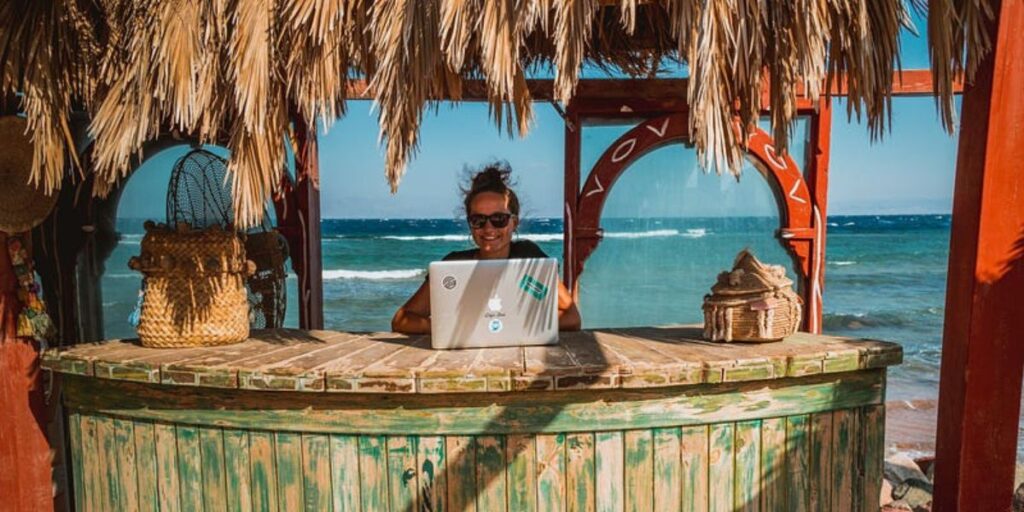Are you dreaming of a life where you can work from anywhere in the world, explore new cultures, and live on your own terms?
If so, becoming a digital nomad might be the perfect lifestyle for you. However, whether you’re starting from scratch or have some remote work and travel experience under your belt, there are key considerations that you should start planning for as soon as possible.
In this blog post, we’ll dive into how to become a digital nomad and go over four to five essential items to add to your moving abroad checklist. From establishing your nomadic income stream to handling logistics and optimizing your banking, we’ll provide you with actionable tips and insights to help you cruise smoothly from country to country. Plus, we’ll also touch on the importance of being in the right mental state for the longevity of your nomad life.
So, whether you’re ready to kiss your current lifestyle goodbye or just starting to explore the possibilities, let’s get started on your journey to becoming a digital nomad.
Without further ado let’s get started!
Table of Contents
5 Steps to Becoming a Digital Nomad
Becoming a digital nomad can be an exciting and rewarding lifestyle choice that allows you to work remotely while traveling the world. Here are five steps to help you become a digital nomad:
1. Build a Strong Skill Set
Building a strong skill set is essential for anyone looking to become a successful digital nomad. The more valuable your skills, the more opportunities you will have to find remote work and increase your earning potential. Here are some tips for building a strong skill set as a digital nomad:
Identify In-Demand Skills
Before you start building your skill set, it’s important to identify which skills are in demand in your industry or field. This can help you focus your efforts on developing skills that are most likely to lead to remote work opportunities.
Research job postings and freelance platforms to see which skills are most commonly sought after. You can also network with other professionals in your field to get a better understanding of which skills are most valuable.
Take Online Courses and Workshops
Online courses and workshops are a great way to learn new skills and stay up-to-date on the latest industry trends. There are many online learning platforms available, such as Coursera, Udemy, and Skillshare, which offer a wide range of courses and workshops at affordable prices.
Look for courses that align with your career goals and interests. Make sure to read reviews and ratings before enrolling to ensure that the course is of high quality and provides value.
Gain Practical Experience
Gaining practical experience is crucial for building a strong skill set. Look for opportunities to apply your skills in real-world settings, such as internships, volunteer work, or freelance projects.
Freelancing platforms like Upwork and Fiverr are great places to find short-term projects that allow you to gain experience and build your portfolio. You can also reach out to local organizations and businesses to see if they have any volunteer or internship opportunities available.
Stay Up-to-Date on Industry News
Staying up-to-date on industry news and trends is essential for building a strong skill set. Subscribe to industry publications and blogs, attend conferences and events, and follow thought leaders in your field on social media.
This will help you stay informed about the latest developments and advancements in your industry, allowing you to adapt and grow your skill set accordingly.
Practice, Practice, Practice
Finally, the key to building a strong skill set is to practice consistently. Dedicate time each day or week to honing your skills and applying what you’ve learned.
Consider starting a blog to showcase your skills and build your portfolio. The more you practice, the more confident and proficient you will become, making you a valuable asset to any remote team or client.
Check out makemoneyforsure.com to learn more!
2. Make Your Job Preparations
Unfortunately, most of us don’t have a trust fund that allows us to quit our jobs to travel — which means that you’ll need to figure out how to generate your own income.
This is the most intimidating part of the process for most people. And sadly, it’s one of the biggest roadblocks that stop dreamers from making the leap.
While some people already have a job that lets them work from home or a cool company that helps them make the switch to remote work, many people just don’t have that luxury.
If you have a hunch that your current job might be open to facilitating your travels, try asking your boss. But if this isn’t an option and you have to quit your job to travel, you’ll just have to create your own revenue stream.
I’m going, to be honest: learning how to start a digital nomad career from scratch can get difficult. But the odds of this working for you are growing by the day, as one study estimated that the majority of U.S. workers are poised to become freelancers by 2027. And this number will naturally grow around the rest of the world too.

Some aspiring digital nomads choose to start a ‘side hustle as they build their own business alongside their current 9-to-5 or part-time job. This might include things like starting a dropshipping business, becoming a social media marketer, creating online courses, or doing freelance graphic design — just to name a few of the hundreds of ways you could generate income online.
The side hustle approach will guarantee that you keep a consistent income flow while you steadily build your digital nomad salary. This can give you some leeway while you navigate the uncertainty of finding a solid new revenue source and learn how to become a digital nomad.
That’s why I strongly recommend this route, especially if your finances are a major concern for making the switch. But make sure you go into it with a resilient, resourceful, and patient attitude, as it can almost double your workload, and it might take a little while for you to pick up steam.
As with any new professional venture, you’ll benefit big time when you accept that challenges — and occasionally failure — are just part of the deal.
3. Sort Through (And Let Go Of) Your Stuff
Calling all hoarders: you’re gonna have to work on that.
When you think about every digital nomad you’ve ever seen, they all have at least a few things in common. One of those things is a noticeable lack of belongings.
Many nomads are backpackers, slinging their entire lives onto their shoulders whenever it’s time to hit the next destination.
While some people are blessed with the gift of not being too attached to their stuff, it’s an understandably difficult process for many others. After all, we’re emotional creatures and our stuff can hold a lot of sentimental value.
In addition to the psychological obstacles, you might also encounter some logistical ones.
What will you do with all the stuff you’re not taking? There are a few options:
- Sell them in a garage sale or online, like Craigslist, Facebook Marketplace, or even Amazon or eBay.
- Get a storage unit for maybe six months or a year with the option of extending if you decide to stay out longer.
- Keep them with a close friend or family member who has some extra space and wouldn’t mind holding onto them.
Selling your stuff can actually be a win-win, as it can double as more cash to pay off some debt or contribute to your emergency fund.
At first, you might have no idea what should stay and what should go. Start with the bigger ticket items and the items that are collecting dust. Ask yourself: have I used this in the past month? Do I really need it?
Try easing yourself into the process by doing a ‘dry run’ right now.
You can even pack a mock suitcase and try living off only those items for a while. The act of physically packing the suitcase will give you the opportunity to go through your stuff and critically think about how much you value and use each item.
And it will make you more mindful of how you actually use them from day to day.
If you try this for at least a couple of weeks, you’ll have a much better idea of what should stay and what should go.
Here are some other things to think about:
- If you have a car, you might want to sell it or rent it out to a friend or family member.
- If you have a home or apartment lease, you can try negotiating with your landlord to shorten your terms.
- Alternatively, you can try renting out the space on a website like Airbnb. Keep in mind that you probably need someone to help manage it while you’re gone unless you find a long-term renter.
Generally speaking, it’s probably not a good idea to get rid of everything you own before you’re certain that nomad life works for you. Try to find a balance that doesn’t put you in a pickle down the road.
4. Prepare to Go International

When you leave your homeland to master how to be a digital nomad, there are a handful of issues that you might not even realize there are issues until they bite you in the bum. These include things like making sure you can easily access your money or that you have the right type of phone to use in other countries.
Optimize Your Access to Money
Watch out for foreign withdrawal and transaction fees. Call your bank and ask what their fees are for international withdrawals. Depending on the answer, you might want to consider getting a different bank with smaller or no fees.
If you find that you’ll be paid in a different currency and your bank charges an arm and a leg to convert it, you might also want to get an international bank account.
Call your credit card companies too to see their foreign transaction transactions. There are plenty of cards with no fees if yours are too steep. And if you need a new card, try something that gives perks like travel points or cash back.
U.S. citizens can check out cards like the United Mileage Plus Explorer, Capital One Venture, and Schwab High Yield Checking.
Tell them you’re traveling. Before you ship out, it’s a good idea to call your bank and credit card companies to let them know where you’re traveling. Otherwise, your account or card may get frozen from ‘suspicious activity’ flagged by their automated fraud detection systems.
Consider a money transfer service. Alternatively, a service like Wise is a favorite of many digital nomads. It offers low transfer and conversion fees, catering to people who send and spend money abroad and get paid in different currencies. They also offer a debit Mastercard.
And surely you’ve heard of PayPal, which also offers a debit Mastercard. While PayPal is massively successful — and a good option in its own right — you’ll likely encounter higher fees for converting currency and sending and receiving money.
Have a backup plan. Part of learning how to be a successful digital nomad is to always have a backup plan. For example, say that your only debit card gets lost or stolen.
How will you access your cash? Will your bank send you a new card internationally? If it won’t, is there a friend or family member back home to who you can have it delivered to, then they can mail it to you?
If you’re in a bind, there are services like Western Union and other local options that allow you to send yourself cash that you can pick up from a physical location, like a Western Union office or a local grocery store in certain cities.
There’s no ‘right’ way to prepare for a situation like this. But in general, you might benefit from having two bank accounts and two credit cards, so that you’re not completely stranded if something happens to the first.
Sort out Your Phone Situation
Does your current carrier have good international options? For example, T-Mobile in the U.S. offers free unlimited 2G data and texting in more than 210 countries.
While a 3G connection won’t be as fast as today’s standard 5G connection, it does the job well enough in between your wifi connections. And it can be a lifesaver when you touch down in a place you’ve never been, only to discover that all of the airport’s local SIM card stands are closed for the day.
With many carriers, you can suspend your phone line for up to a few months and pay a small fee like $10 per month instead of your full-service bill. This way, you don’t have to lose your phone number by completely canceling your service.
Once you suspend or cancel your phone, you can just pop in a local SIM card to have data in between wifi spots in each city you visit. This will keep you connected so you don’t have to worry about emergencies.
To make sure your phone is compatible with a local SIM card, it should cover two bases:
- It’s unlocked. Many phone companies will sell you a locked phone, which means that it’s restricted to only give you service from that carrier or in a certain country. If you’re buying a new phone, you can buy one that’s unlocked. Or you can call your phone carrier and ask them to unlock your current phone, which is usually a fairly simple process.
- It’s GSM. This is mainly an issue with U.S. phones. There are two main radio technologies that smartphones use to connect to the world: CDMA (Code Division Multiple Access) and GSM (Global System for Mobiles). While there are a few U.S. carriers that still use CDMA, namely Sprint and Verizon, other U.S. carriers and most of the world use GSM. That’s why using a GSM phone will minimize potential complications with using international SIM cards.
If you need to make international calls, you can likely get a SIM card package that includes them. But that can get really pricy real quick.
Check out cheap internet-based calling services like Skype or Google Voice. If you need to have frequent conference calls with clients, try a service like Zoom, Webex, and Join.me, which can connect audio via the internet or a traditional phone line.
Be Proactive With Your Healthcare
Consider travel or nomad insurance. Traditional travel insurance can get murky for a digital nomad who’s constantly on the move. Fortunately, companies like World Nomads specialize in this kind of situation. They offer flexible plans that cover certain places and activities, and you have the option to extend your coverage to keep traveling.
You can also get coverage for your belongings, like lost or delayed baggage from travel, or if any of your stuff is stolen.
Get your checkups. If you currently have insurance and trusted healthcare providers like a family doctor or dentist, get your regular checkups and cleanings before you leave home. If you have medication prescriptions, see if you can stock up, and research your options for getting refills on the road.
While travel insurance is great for emergencies, it’s more difficult to get coverage for routine services. Plus, the overall quality and availability of healthcare will vary depending on where you’re going. Best to cover your bases at home.
Go paperless
If you currently get important bills, notices, and other communications via snail mail, contact all of these companies and ask to receive them via email. If you need the paper copies, have the mail forwarded to someone who can safeguard them for you while you’re away.
5. Embrace the nomad lifestyle
Embracing the nomad lifestyle is an essential part of being a successful digital nomad. As a digital nomad, you have the freedom to work from anywhere in the world and to explore new places and cultures. Here are some tips on how to embrace the nomad lifestyle:

- Be open to new experiences: Embrace the new experiences that come with traveling and living in different places. Be open to trying new foods, learning new languages, and immersing yourself in new cultures.
- Be flexible: Being a digital nomad means you need to be flexible and adaptable. You may encounter unexpected challenges, such as poor internet connection or language barriers, but it’s important to remain calm and find creative solutions.
- Connect with other digital nomads: Joining digital nomad communities, attending meetups, or using coworking spaces can be a great way to meet other like-minded individuals who share your lifestyle. They can offer support, advice, and inspiration.
- Create a work-life balance: Working remotely can blur the lines between work and leisure time. It’s important to set boundaries and establish a work-life balance that works for you. Make time for leisure activities, travel, and self-care.
- Stay organized: It’s important to stay organized when you’re constantly on the move. Keep track of your travel plans, expenses, and work schedules to avoid unnecessary stress.
- Stay connected: Despite being on the move, it’s important to stay connected with family, friends, and colleagues. Use technology like video calls and messaging apps to stay in touch.
- Embrace freedom: The nomad lifestyle offers a level of freedom and flexibility that traditional office jobs may not. Embrace this freedom and take advantage of the opportunities it offers.
Embracing the nomad lifestyle is an essential part of being a successful digital nomad. By being open to new experiences, staying flexible, connecting with other digital nomads, creating a work-life balance, staying organized, staying connected, and embracing freedom, you can make the most of your nomad lifestyle and create a fulfilling and rewarding career.
How To Become a Digital Nomad FAQs.
How much does a digital nomad make?
The income of a digital nomad can vary greatly depending on several factors such as the skills they possess, the type of work they do, the clients they have, and the cost of living in the countries they choose to live in.
Some digital nomads may earn a six-figure income, while others may earn less than $1,000 per month. The key to success as a digital nomad is to find a sustainable income stream that allows you to cover your expenses and have some extra funds for travel and leisure.
Who qualifies as a digital nomad?
A digital nomad is someone who uses technology to work remotely and leads a location-independent lifestyle. They can be anyone from freelancers, and entrepreneurs, to remote employees who work for companies based in different countries.
What defines a digital nomad is their ability to work from anywhere in the world with an internet connection, allowing them to travel and live in different countries while earning a living.
What do digital nomads actually do?
Digital nomads can work in a wide range of industries and professions, from digital marketing, web development, writing, and graphic design, to teaching and consulting. They typically work online, using digital tools to communicate with clients and colleagues, manage projects, and deliver work. The type of work they do depends on their skills and experience, as well as the needs of their clients or customers.
Is it hard to be a digital nomad?
Becoming a digital nomad requires a certain level of discipline, adaptability, and resilience. It can be challenging to manage work and travel, especially when dealing with different time zones, cultural differences, and unexpected situations. However, with the right mindset and preparation, the digital nomad lifestyle can be both rewarding and fulfilling.
The key to success is to have a clear plan, establish a sustainable income stream, build a support network, and prioritize self-care and work-life balance.
The bottom line
Becoming a digital nomad is an exciting and rewarding lifestyle that allows you to work from anywhere in the world, as long as you have a reliable internet connection. While it can be challenging to get started, the key to success is to have a clear plan and to take action.
To become a digital nomad, you should first assess your skills and find ways to monetize them online. You may need to acquire new skills, such as digital marketing, web development, or online teaching, to make a successful transition to remote work.
Next, you should create a plan for your digital nomad lifestyle, including your travel plans, work schedule, and financial goals. This will help you stay focused and motivated as you navigate the challenges of working remotely. It’s also important to build a network of like-minded individuals who can provide support and guidance as you embark on this new adventure. You can join digital nomad communities online or attend conferences and meetups to connect with other remote workers.
Finally, it’s essential to maintain a healthy work-life balance as a digital nomad. While it can be tempting to work all day and explore new places at night, it’s important to prioritize self-care and downtime to avoid burnout.
Overall, becoming a digital nomad requires a combination of hard work, flexibility, and adaptability. With the right mindset and preparation, you can enjoy the freedom and flexibility of remote work while exploring new places and cultures around the world.







